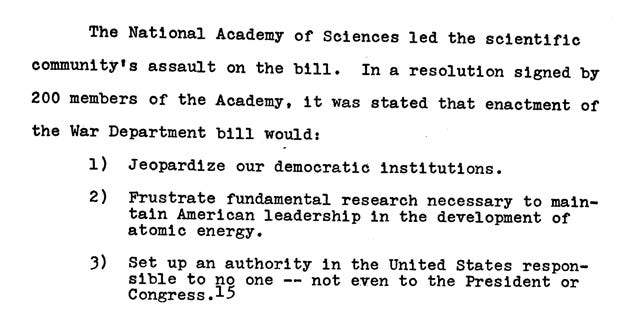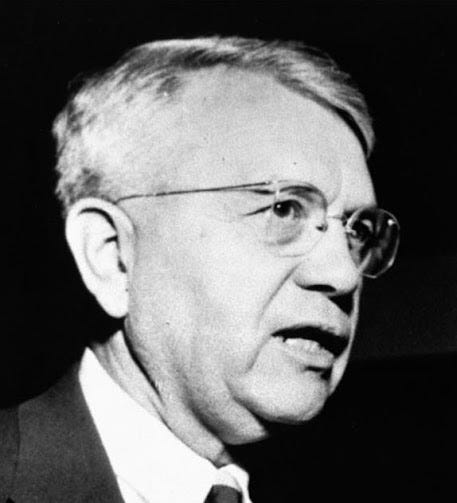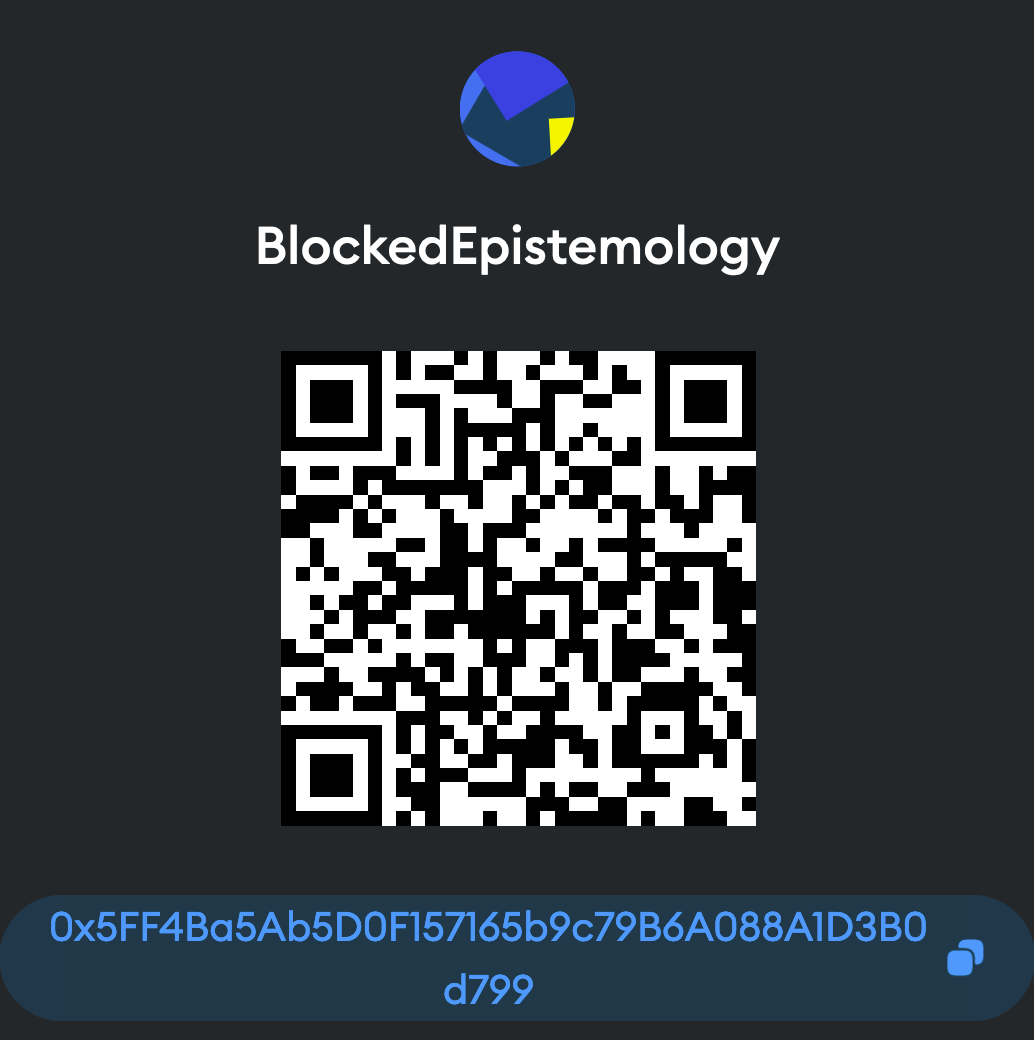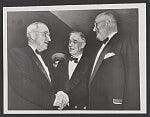'The Bill is of Doubtful Constitutionality'
An open letter to participants of The Legacy Program
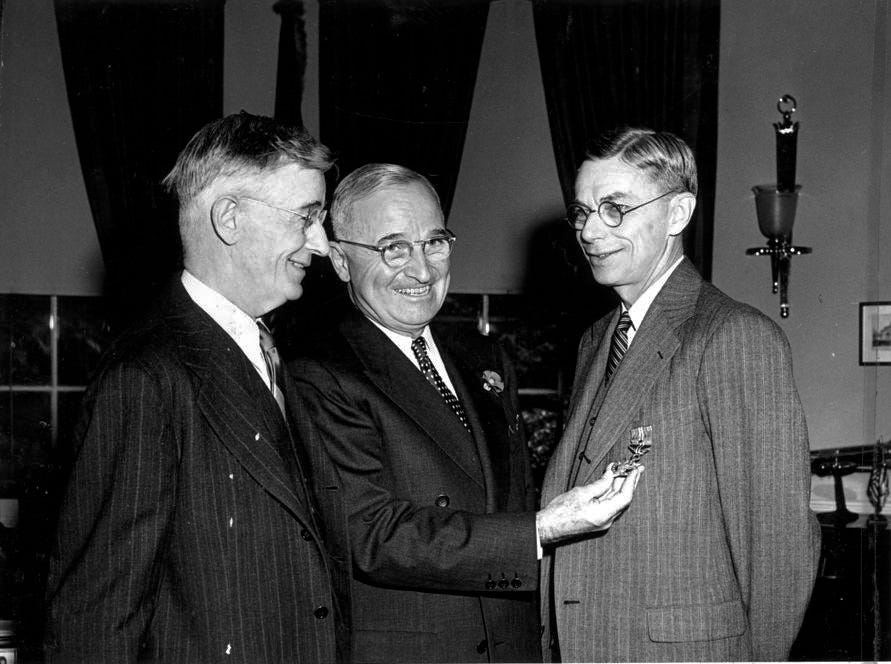
Table of Contents
Dear ‘The Legacy Program’ participant
Operationalization Scenarios
1st pathway
2nd pathway
3rd pathway?
4th pathway
Policy Analysis
The legislators weigh in
The journalists have their say
The scientists speak
Recap
In Closing
Acknowledgements
Bibliography
Unlock Further Investigation
License
Appendix
[This article is free of any AI content]
I’ve been wanting to get into scenario analysis & especially policy analysis on May-Johnson for some time now. But first, updating:
Updates
• I’ve posted a more academically-themed (w/ doi) version of the May-Johnson article to ResearchHub ResearchHub is a key contributor to the nascent ‘Decentralize Science’, aka #DeSci ecosystem. I’ve posted there because I wanted to lay rails for incentiving peer reviewers of my May-Johnson analysis vis-a-vis- MJ-12. It is in the ResearchHub community called “Contemporary History”, which covers 1945 to the present.
https://www.researchhub.com/paper/6693378/on-the-meaning-of-mj-12-in-the-majestic-twelve-documents-and-implications
Besides the (slightly) drier academic tone, I’ve also added a little more analysis focusing on the possibility of the first Majestic drop as a good-faith leak with key content necessarily changed for whistleblower self-protection from reprisals. (I think Stanton Friedman had already gone a long way toward ruling out the garden-variety, frat-boy style, hoax, and the fact that the MJ=May-Johnson association was evidently sophisticated enough to have gone unnoticed for 37+ years further renders that case’s probability further negligible). Other than that, it’s pretty much the same analysis as the blog post. If you want to see the work tested the harsh light of public critique, thereby improving its citeability in the press, tell your friends to participate as peer reviewers or donate ResearchCoin to incentivize reviews.
• As alluded to in the long-from post of a month ago, I’ve begun the process of seeding a decentralized-from-the-top-down distributed research effort to take investigating The Legacy Program to the next level. That starts with a Zenodo repository node called RDaoB. A simple stub, with others like it even on Zenodo, such as SCUAP, but I think it presents the unique niche — re-assessing postwar history given reality of The Phenomenon & the government’s response to it — that researchers may wish to draw from and commit content to.
Its name is intended to evoke Vannevar Bush’s postwar vision of scoped technology development, the Research and Development Board. I envision RDaoB to operate as a DAO (decentralized autonomous organization in the Web3 sense) in order to be designed for robustness against being compromised. In this nascent stage, readers’ feedback in forming the DAO’s rules will be invaluable. For now it is just the repository with myself approving or rejecting scholarly content & data submitted to it. So if you’re a researcher feeling so inclined, you can submit data & analysis to it (no classified content please). That starts with the ResearchHub post mentioned earlier.
• Thanks to the streetlight effect, it would be all too easy for us to fixate on studying after a MJ-12-like group at the expense of considering parallel efforts whose paperwork didn’t get dropped into somebody’s mailbox in 1984. There can easily be other groups, outside a MJ-12-like control group, operating amid the same kind of intra-governmental competition as manifests in many other aspects of government. Turf wars, infighting, competition between the services, are facts of life in government. I highlight the formation of the Research and Development Board (Zachary 1997) and the NSA (Burns 1990) as examples. We have no reason to believe that the UAP topic is immune from this fundamental bugbear of government. This is all only to say that it should not be concluded from my work that MJ-12 can be the only game in town.
Audience
In writing this post I want readers to understand I have an angle: While I’m interested in maintaining the interest of the generally UAP-interested reader, I write with a particular audience in mind: That of participants in The Legacy Program. I harbor just enough hubris to think that my content might find its way under the eyes of individuals working for it, whether knowingly or by a degree removed i.e. under some pretext (“this is Russian/Chinese technology, now please figure out how it’s able to contract spacetime’, etc…). If nothing else at least maybe my work finds its way under The Legacy Program’s disinformation artists — an advancement, of sorts. My reasons for writing to this audience are selfish ones: I want to encourage participants to feel justified in turning whistleblower, and I want would-be whistleblowers to feel the social tailwinds needed to do so.
Dear ‘The Legacy Program’ participant,
After you’ve reviewed my last couple of posts, you are aware of the case I’ve made of the likeness between the May-Johnson bill and The Legacy Program, as tied together by the first Majestic drop. Whether that drop was a disinfo feint, a good-faith leak — sounding an alarm but utilizing security-preserving changes — or finally, accurate reality, the analysis here assumes, under any of these cases, the underlying requisite of The Legacy Program’s origination ‘rhyming’ with, or otherwise being inspired by, the May-Johnson saga of prosaic history.
As the reader, I envision you as a young Legacy Program participant (even postdocs can be young) going to your manager and saying, “Hey boss, maybe what we’re doing isn’t legal. I don’t think I should be participating in anything illegal, you know?”. To which the boss responds, “Oh don’t listen to what some blogger wrote, be careful what you read online, here, have a bonus/promotion, etc…” But then when pressed, your supe says, “Oh there were some bills passed a while ago, it’s totally democratic and with oversight, I just can’t tell you what bills those are because it’s classified, national security and all - you wouldn’t want me to have to review your clearance for inquiring, do you?”
So with this letter, I want to speak to that particular envisioned argument.
Operationalization scenarios
The first question I want to speak to is, “Is there any scenario in which a May-Johnson-inspired operating paradigm could have been implemented that would be seen as statutorily legitimate by its participants, however tenuously (and without the opportunity for others to pass judgement on legitimacy)?
1st pathway
Here we tread on the domain that is called “Secret Law”. Saying that much means I have to specify one thing very very clearly at the outset. I am not a lawyer. So the best I can do in credibility is to point readers to quote the sources of people who are lawyers and have written on the topic of secret law, as well as cite some specific examples from history contemporary to the alleged formation of MJ-12.
The two legal scholars I am aware of on the topic of secret law are 1) Dakota Rudesill and 2) Elizabeth Goitein. They have written extensively on the topic. Much of it is in context of post-Patriot Act legislation, but with some reference to the history of secret law during the 20th century.
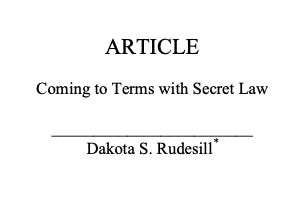
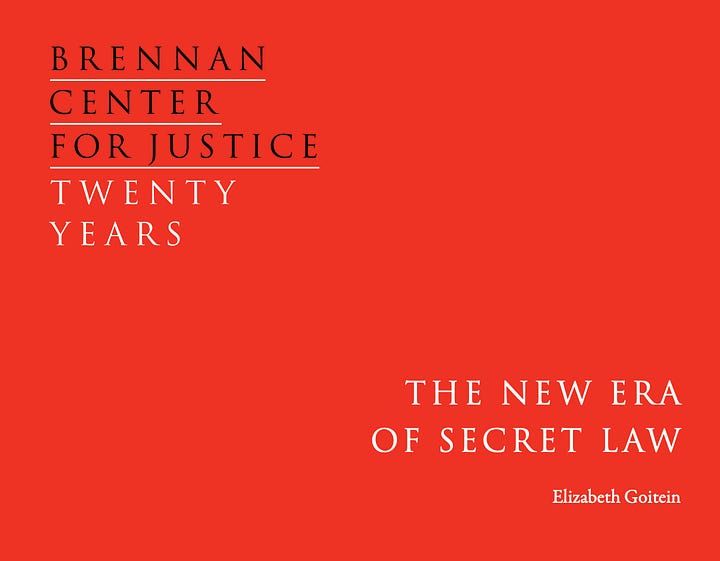
What is secret law? Paraphrasing these authors, it’s the passage or interpretation of any law, even one that affects the public, for which the public are not allowed to know what that law is. At its most extreme, this means that a member of the public could unwittingly transgress against that law, suffer consequences for it, without having had any means of ascertaining that the law even existed in the first place. (This version is called a ‘Kafka law’ in Rudesill’s teaching.
Rudesill describes how, in the 20th century, a secret law could effectively be passed within the scope of a broad bill that Congress passed, but with sub-appopriations directed by relevant members of Congressional committees. We would know this today as, for example, an NDAA that passed with funds applied toward a general black budget, for which the amounts of funds applied to specific programs would be communicated to the executive via confidential communications.
So if our unscrupulous manager in The Legacy Program tried to convinced his/her reportee that The Legacy Program was originally funded by some sort of unpublished appropriation, we sitting here would not be in a position to contest that out of hand - in other words, its plausible, (but our conscientious Program employee should strive to demand the paperwork even so).
2nd pathway
The 2nd pathway this non-lawyer before you is aware of is demonstrated by precedent. The precedent is the formation of the National Security Agency in 1952.
It appears that NSA’s formation is best termed as a progressive ‘accretion’ of corresponding communications intelligence functions from the several competing armed services branches. This process, rife with bureaucratic infighting (Burns 1990), took place over several years primarily right after WWII. It’s punctuated by Truman’s memorandum of October 24th, 1952 formally imitating the NSA into existence. The memorandum was secret — not public.
While references to the National Security Agency enter the public Congressional Record by early 1953, it’s not until the early 1970s that the public really starts becoming aware of the NSA’s existence — twenty years after it had already been in full, funded operation in its current form. (Burns 1990) makes no mention of Congress or Congressional members in the lead-up to the Truman memo; absent any ‘secret law’ remaining so to this day, I conclude that there was no dedicated act of Congress that mandated NSA into existence. Being under the Department of Defense, its funding could have flowed from a reshuffling of already appropriated defense funds. It also could have been funded by appropriations under Congressional scope, even if the nature of the appropriations were not articulated in detail.
With such a powerful precedent of opacity as the formation of the NSA (contrast with the transparent 1958 conversion of NACA to NASA), it’s hard to imagine that Truman couldn’t have had a similarly secret memorandum midwifing an MJ-12-like organization into existence. Therefore a constitutional power-of-the-purse argument could be circumvented if the story of MJ-12’s formation mirrored that of the NSA. While I still feel that the Legislative branch’s power-of-the-purse was in-principle being violated, I wouldn’t expect that earnest lawyers could necessarily win a court case on that (absent the gutted 1970 Mansfield amendment regime).
(I’m going to really wanted to soapbox a minute here and reflect that, in retrospect of reviewing the NSA history and the very possibly real prospect of MJ-12 history, that President Truman was no custodian to civil liberty. Upon a bit of research into this thread, it seems he was a product of the Red Scare era of his time, with instances of both fighting for, and undermining, civil liberties. Mixed / middle of the road takes here and here; oddly none of these sources I could find mention the formation of the NSA).
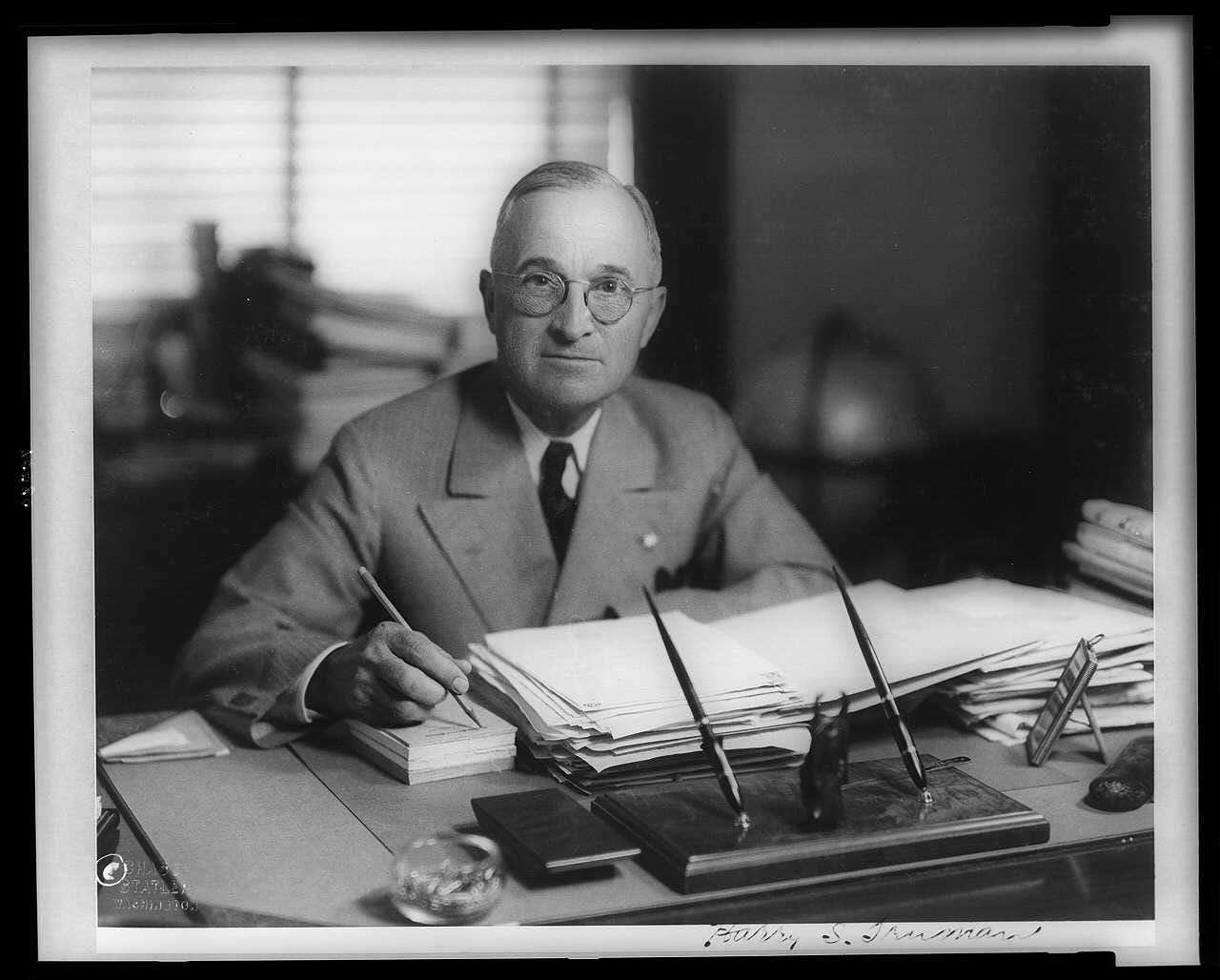
3rd pathway?
Could there be other pathways in which a May-Johnson-inspired operation could have seen implementation? Remember I’m not a lawyer, I can’t rule out alternative approaches, so feel free to armchair-litigate in the comments.
4th pathway
Some soft of volunteer, informal or cabal-like activity. This would be the least defensible ‘legislative’ origin story for any operations undertaken under The Legacy Program’s aegis in my view— that is, if anyone ever managed to dispositively ascertain the veracity of this pathway. In this case, even participants, (and only if they were accurately informed) would recognize they were participating in an illegitimate governmental enterprise.
Policy analysis
The policy analysis question will assume sufficient satisfaction of the above statutory legitimacy question — sufficient at least for the blinkering purposes of The Legacy Program management insiders. Rather then, I’d like to examine some constitutional questions other than power-of-the-purse, as well as what we could expect from a bureaucratic power-expansion perspective. In the debates of the time, these were actually the main questions, while the prospect of military domination of a May-Johnson AEC was a proxy concern that was more easily digested by the public. While the risk of domination by military per se was a real concern, this analysis will not focus on that particular aspect (or else it would be too long).
Unfortunately, even while I remain as much a non-lawyer as I was two paragraphs ago, I am also not a policy analyst. Of the several individuals with legal background I engaged with on this, they all said, to-a-T, that the effort involved for a legal professional to do policy analysis on this topic would require such a specialized background and would be so extensive as to require enormous expenditure of time & resources (resources which are not at hand). So instead, I cite the very legislators and contemporary journalists working the legislative beat who complained loudly about May-Johnson.
Just so that we’re aligned on what exactly it is we are talking about, to start with we’ll go over the most key points (but by no means all the key points, it really is worth reading through the bill firsthand) of May-Johnson. For these, I am using (Seaver 1967), i.e. this isn’t my own aggravated reading of the bill with an axe-to-grind. The May-Johnson bill consists of:
A Commission would be established to control the development and use of atomic energy in the US
The Commission would consist of nine members( remember this is after the Royall-Marbury treatment, not the original Bush-Conant summary), initially appointed by the President with the consent of the Senate
Commission members serve nine year terms, enjoy per-diem comp.
Commission can engage anyone without regards to Civil Service Laws (means they can employ active members of the armed services
1 or 2 Commission members would be military
It would be unlawful for any person to conduct atomic research without commission consent
Commission has custody of all raw materials, deposits, plants, facilities, equipment, technical information (for which it is possessed of an expansive mandate on securing said technical information, where it has unchecked latitude on determining what is in scope), and patents.
A Full-time Administrator and Deputy administrator, $15k and $12k annual salary (c. 1945 dollars) respectively, and imbued with these sweeping powers:
Administrator can conduct atomic research through commission facilities or can contract out
can control all research activities in other government agencies. except military research.
can acquire (including condemning / eminent domain) any property or facilities for commission research
(With commission approval) empowered to license all propoerty to other government agences or other persons
Much of the analyses that follow largely parallel (Seaver 1967), which itself, appropriately, draws heavily from New World (Hewlett & Anderson 1962), the atomic historian’s go-to secondary source for the history of atomic energy.
The legislators weigh in
Sen. Vandenberg was our nation’s vanguard defense against May-Johnson. The Congressional record demonstrates that he was manifestly suspicious of the bill that had suddenly been foisted on Congress’s upper and lower house simultaneously.
(Hewlett & Anderson 1962): “By a parliamentary maneuver, Vandenberg prevented referral of Johnson's bill to any committee pending House action on his concurrent resolution. Thus were the opposing forces stalemated before the battle had really begun”
In other words, he managed to initiate the first delay in its passage, buying precious time and triggering deeper review.
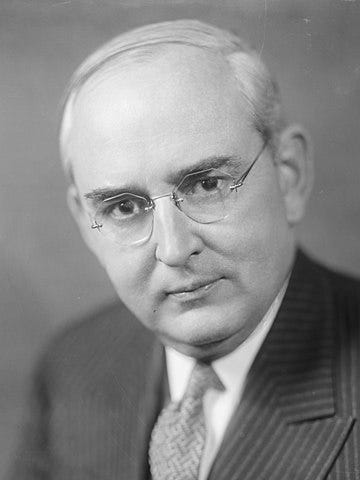
That deeper review commences with Rep. Holifield (D-CA) & Rep. Price (D-IL). They write a dissenting minority opinion as members of the very Military Affairs Committee of which Rep. May himself is chair.
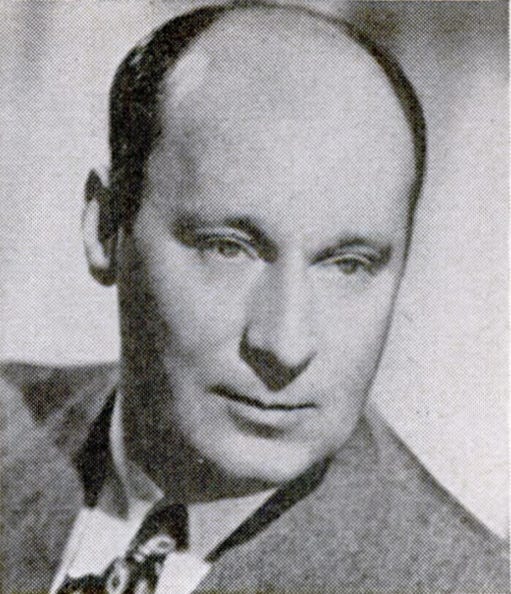
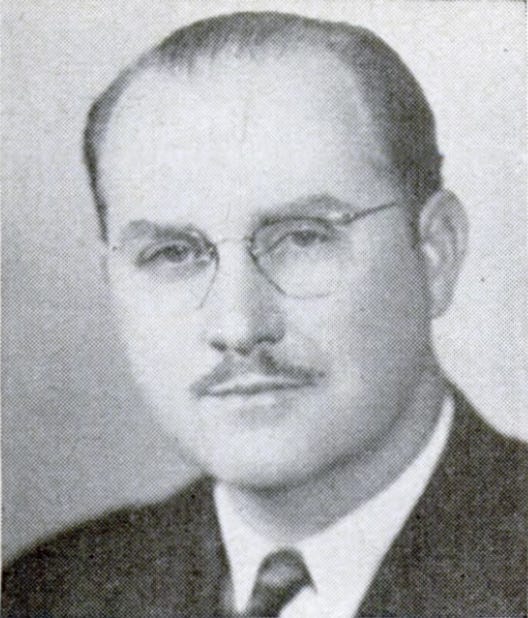
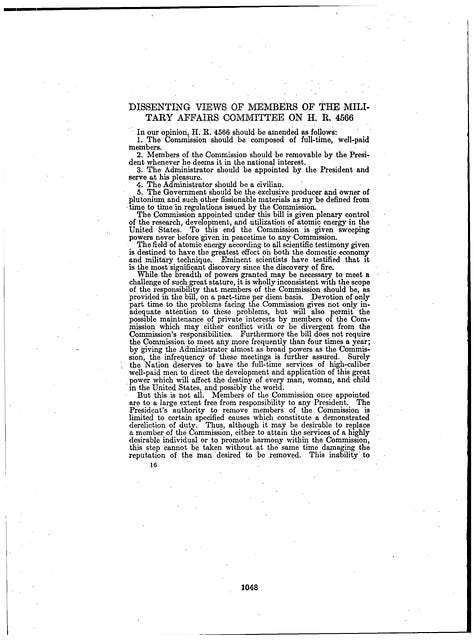
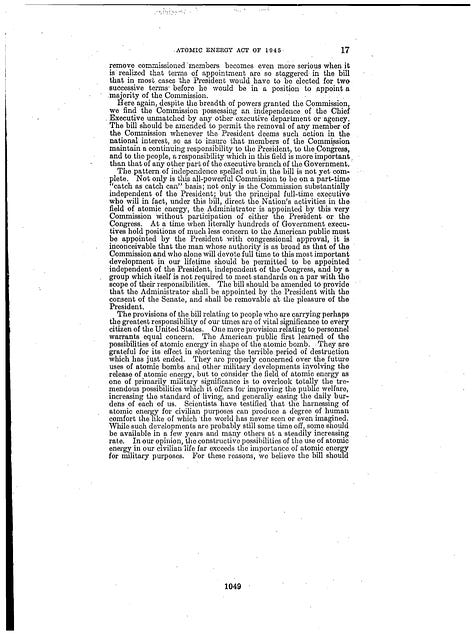
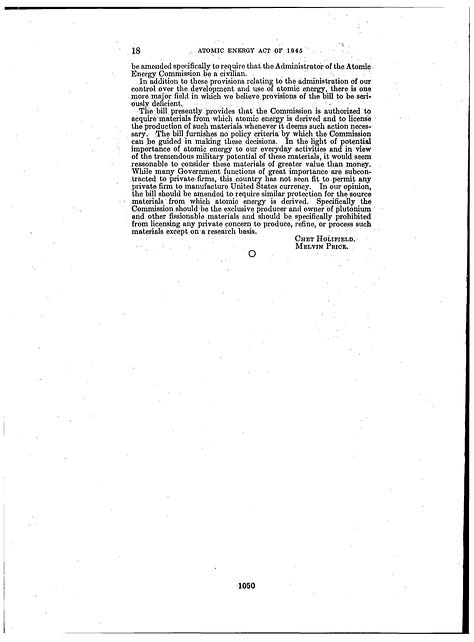
Highlights:
Members of the Commission should be removable by the President whenever he deems it will be in the national interest.
The Adminsitaor should be appointed by the President and serve at his pleasure.
The Administrator should be a Civilian
"...by giving the Administrator almost as broad powers as the Commission, the infrequency of these meetings is further assured."
"Members of the Commission once appointed are to a large extent free from responsibility to any President."
"despite the breadth of powers grnnted the Commission, we find the Commission possessing l1n independence of the Chief . Executive unmatched by any other executive department or agency."
"The bill should be amended to permit the removal of any member of the Commission whenever the President deems such action in the national interest, so as to insure that members of the Commission maintain a continuing responsibility to the President, to the Congress, and to the people, a responsibility which in this field is more important. than tlrnt of any other part of the executive branch of the Government.·"
"it is inconceivable that the man whose authority is as broad as that of the Commission and who alone will devote full time to this most important development in our lifetime should be permitted to be appointed independent of the President, independent of the Congress, and by a group which itself is not required to meet standl1rds on a par with the scope of their responsibilities."
"We believe the bill should be amended specifically to require that the Adminsitraotr of the Atomic Energy Commission be a civilian."
Reps. Holifield & Price’s dissent is paired alongside the additional minority dissenting view, in the very same Military Affairs Committee, from Reps. Short-(R-MO), Arends-(R-IL), Clason-(R-MA), Sheridan-(D-PA), Shafer-(MI), Elston-(R-OH), Harness-(R-IN), Fenton-(R-PA), & Luce-(R-CT).
(Seaver 1967) outlines their views most ably:
“Opposition to the bill also came from several members of the Military Affairs Committee of the House, who issued a minority report when the bill was reported. These men felt that the bill was too vague in its provisions and gave the commission an excess amount of power.” -(Seaver 1967)
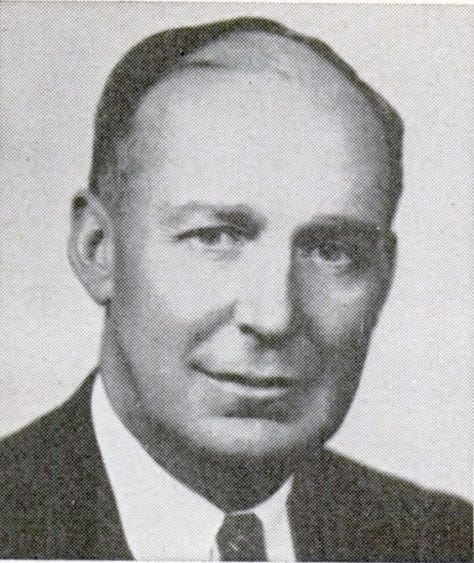
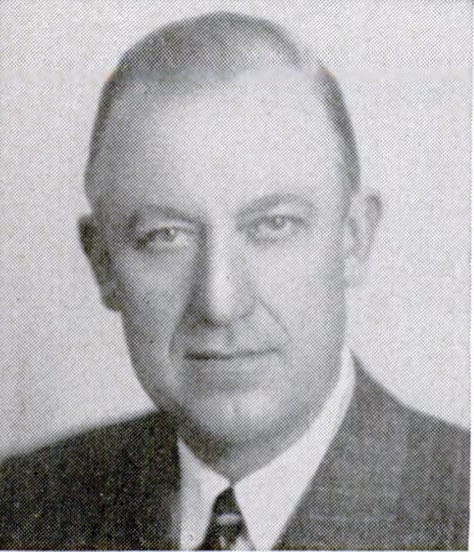
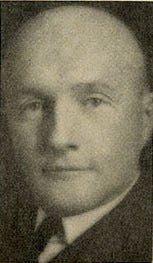
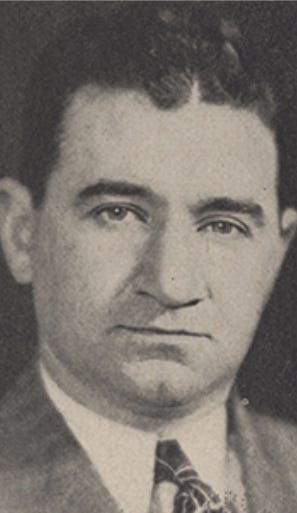
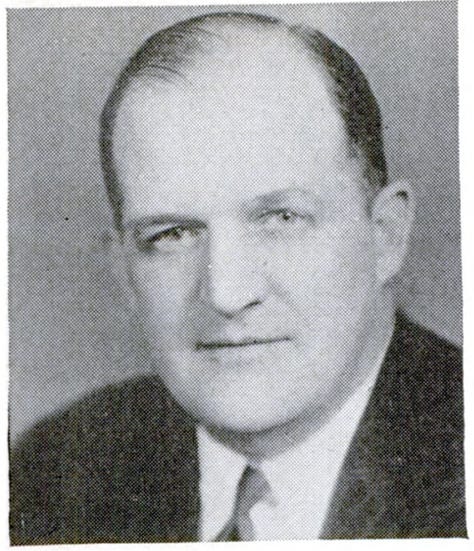
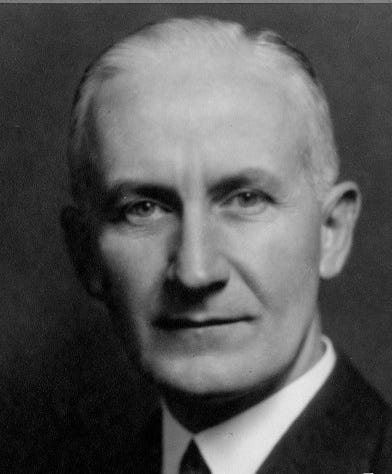
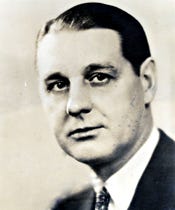
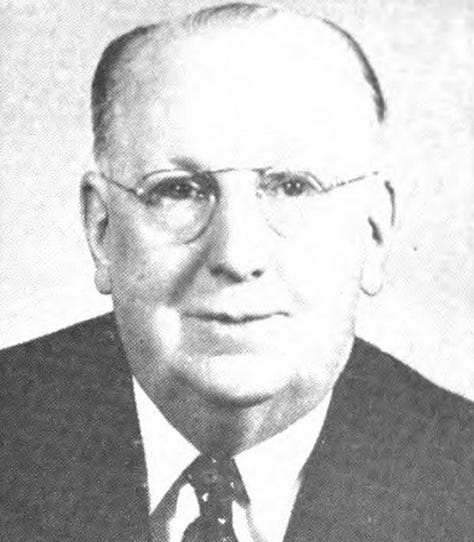

(If it looks like all these Congressmen from yesteryear are looking out, judging you, Legacy Program participant, it’s because they are.)
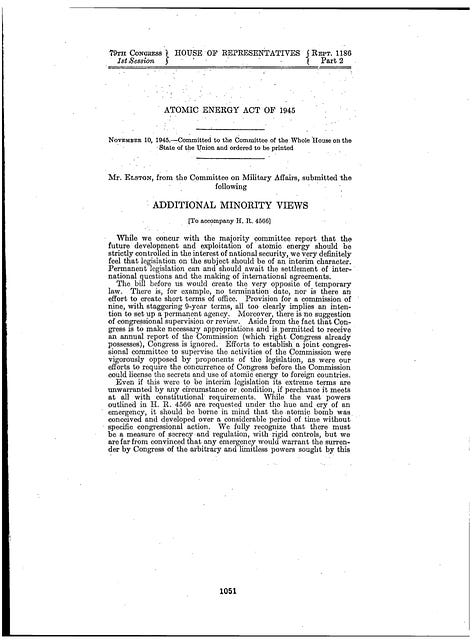
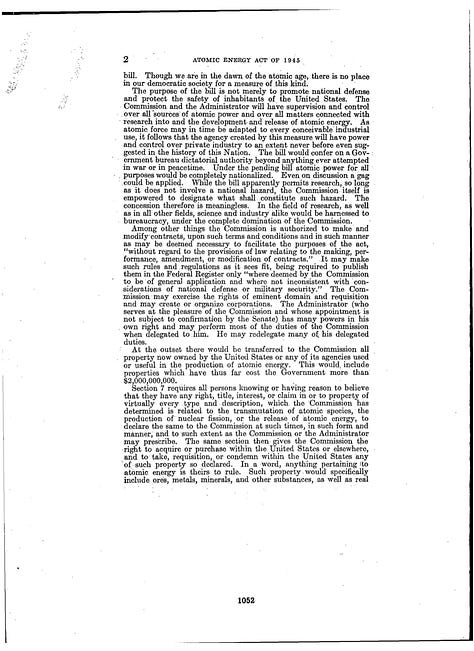
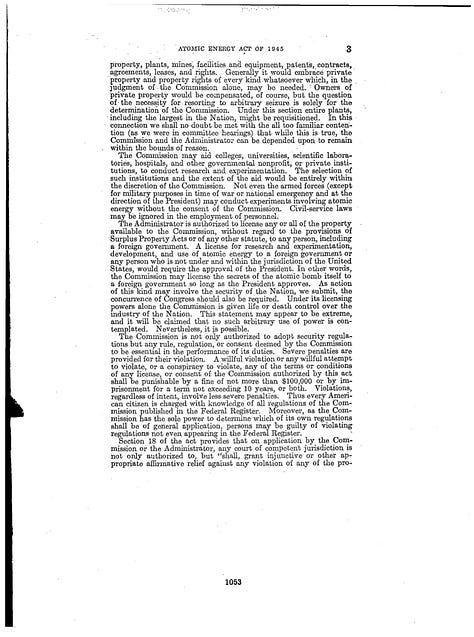
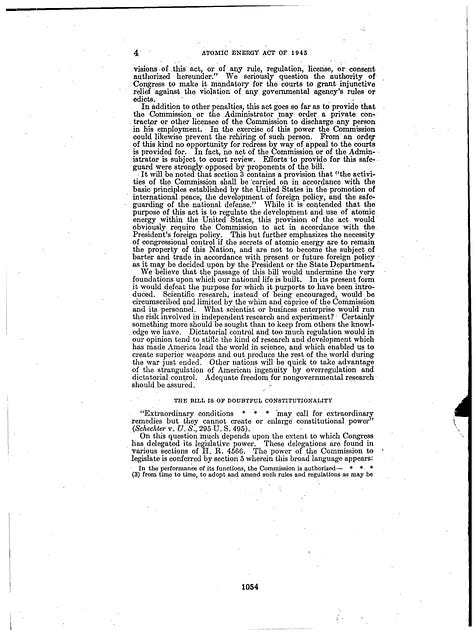
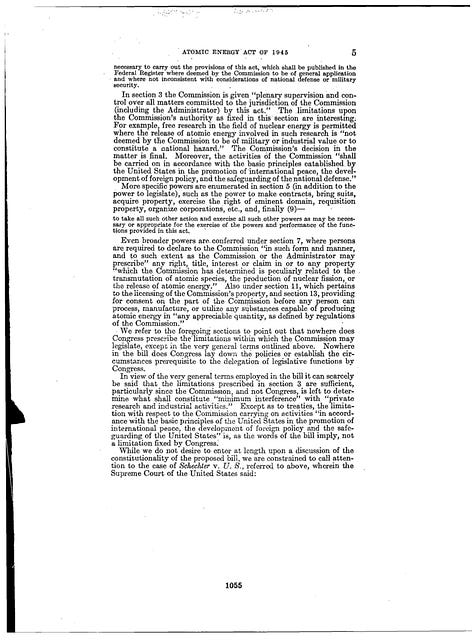
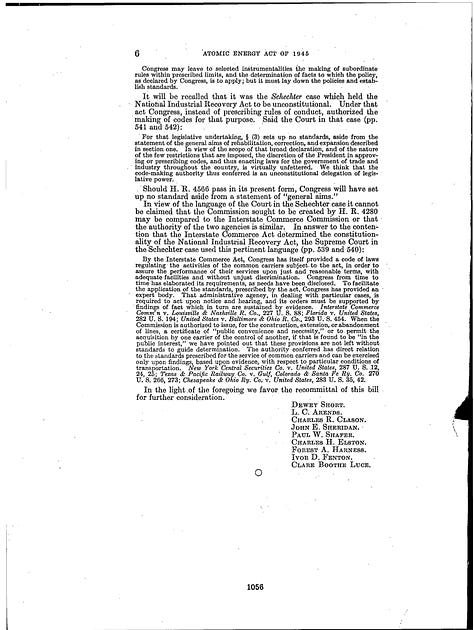
In rapid-fire here you have the relevant quotes from the committee minority’s Congresspeople. (As throughout), you may treat their comments as facing the administrating paradigm of The Legacy Program. I will let the sheer volume of relevant quotes from their dissenting opinion describe this 2nd committee minority’s take on the bill:
"There is, for example, no termination date, nor is there an effort to create short terms of office."
"Provision for a commission of nine, with staggering 9-year terms, all too clearly implies an intention to set up a permanent agency."
"Aside from the fact that Congress is to make necessary appropriations and is permitted to receive an annual report of the Commission (which right Congress already possesses), Congress is ignored."
"Efforts to establish a joint congressional committee to supervise the activities of the Commission were vigorously opposed by proponents of the legislation.”
“we are far from convinced that any emergency would warrant the surrender by Congress of the arbitrary and limitless powers sought by this bill”
"...there is no place in our democratic society for a measure of this kind."
"The Commission and the Administrator will have supervision and control over all sources of atomic power and over all matters connected with research into and the development and release of atomic energy."
(remember, as throughout, you can read atomic as replaced with NHI ‘Technologies of Unknown Origin’, or TUO)
"As atomic force may in time be adapted to every conceivable·industrial use, it follows that the agency created by this measure will have power and control over private industry to an extent never before even suggested in the history of this Nation."
(Actually reflects what I said in the long-form piece about the commission is skating to where the economic puck is going)
"The bill would confer on a Government bureau dictatorial authority beyond anything ever attempted in war or in peacetime."
"Even on discussion a gag ..could be applied."
"In the field of research, as well as in all other fields, science and industry alike would be harnessed to bureaucracy, under the complete domination of the Commission."
"Among other things the Commission is authorized to make and modify contracts, ... without regard to the provisions of law relating to the making, performance, amendment, or modification of contracts."
“It may make such rules and regulations as it sees fit, being required to publish them in the Federal Register only ‘where deemed by the Commission to be ... not inconsistent with considerations of national defense or military security.’“
"In a word, anything pertaining to atomic energy is theirs to rule."
(Again, atomic energy —> TUO)
“Generally it would embrace [i.e. annex] private property and property rights of every kind whatsoever which, in the judgement of the Commission alone, may be needed. "
"Owners of private property would be compensated, of course, but the question of the necessity for resorting to arbitrary seizure is solely for the determination of the Commission. Under this section entire plants, including the largest in the Nation, might be requisitioned. In this connection we shall no doubt be met with the all too familiar contention (as we were in committee hearings) that while this is true, the Commission and the Administrator. can be depended upon to remain within the bounds of reason."
(If you listen closely you can practically hear Vannevar’s salty Cape Code growl dripping from the committee hearing’s witness stand through that last quote)
"Civil service laws [proscribing military persons from serving in traditionally civilian capacities] may be ignored in the employment of personneL"
"Under its licensing powers alone the Commission is given life or death control over the industry of the Nation. This statement may appear to be extreme, and it will be claimed that no such arbitrary use of power is contemplated. Nevertheless, it is possible."
"We seriously question the authority of Congress to make it mandatory for the courts to grant injunctive relief against the violation of any govemmental agency's rules or edicts."
"Thus every American citizen is charged with knowledge of all regulations of the Commission published in the Federal Register. Moreover, as the Commission has the sole power to determine which of its own regulations shall be of general application, persons may be guilty of violating regulations not even appearing in the Federal Register."
(Remember all that secret-law work I cited earlier..?)
"In addition to other penalties, this act goes so far as to provide that the Commission or the Administrator may· order a private contractor or other licensee of the Commission to discharge any person in his employment. In the exercise of this power the Commission could likewise prevent the rehiring of such person. From an order of this kind no opportunity for redress by way of appeal to the courts is provided for."
"We believe that the passage of this bill would undermine the very foundations upon which our national life is built."
"Scientific research, instead of being encouraged, would be circumscribed and limited by the whim and caprice of the Commission and its personnel."
“What scientist or business enterprise would run the risk involved in independent research and experiment? Certainly something more should be sought than to keep from others the knowledge we have.”
“Dictatorial control and too much regulation would in our opinion tend to stifle the kind of research and development which has made America lead the world in science,...Other nations will be quick to take advantage of the strangulation of American ingenuity by overregulation and dictatorial control. Adequate freedom for nongovernmental research should be assured.”
“For example, free research in the field of nuclear energy is permitted where the release of atomic energy involved in such research is ‘not deemed by the Commission to be of military or industrial value or to constitute a national hazard.’ The Commission's decision in the matter is final.“
(Yet again reminding, atomic energy —> TUO)
"More specific powers are enumerated in section 5 (in addition to the power to legislate), such as... finally ‘to take all such other action and exercise all such other powers as may be necessary or appropriate for the exercise of the powers and performance of the functions provided in this act. ·’ "
Oh, but the piece de resistance of the Reps. Short et al.’s views:
“ THE BILL IS OF DOUBTFUL CONSTITUTIONALITY
Extraordinary conditions may call for extraordinary remedies but they cannot create or enlarge constitutional power (Schechter v. U.S., 295 U.S. 495).”
Of that last, (Seaver 1967) goes on to describe:
“The minority report … contained the belief of the signers that the bill was of questionable constitutionality. Citing Schechter v. United States, it was argued that, under H.R. 4566, the Congress would be delegating its legislative powers.”
Indeed, the legislators express concern over the fact that Congress cannot delegate its power to create laws, and May-Johnson would do just that, giving the atomic Commission the power to determine what research activity falls within its atomic research jurisdiction. They cite a case that is evidently famous among constitutional lawyers, Schechter vs. United States, the famous “sick chicken” case, but I’m personally poorly placed to assess the parallel between Schechter and May-Johnson. Yet this presents the priceless opportunity that whenever you want to discreetly intimate to someone on the constitutionality of a UFO control program, you can refer to “sick chickens” 🤧🐔🐔.
The journalists have their say
Now, let’s see what contemporary journalists had to say. (Let’s take a moment to thank these legislators of 1945 for entering the entire editorial articles into the Congressional Record so we can refer to them 80 years later without having to go through some archive’s paywall)
Washington Post editorial
First we have Washington Post’s editorial, as entered into the record by Rep. Douglas (D-CA)
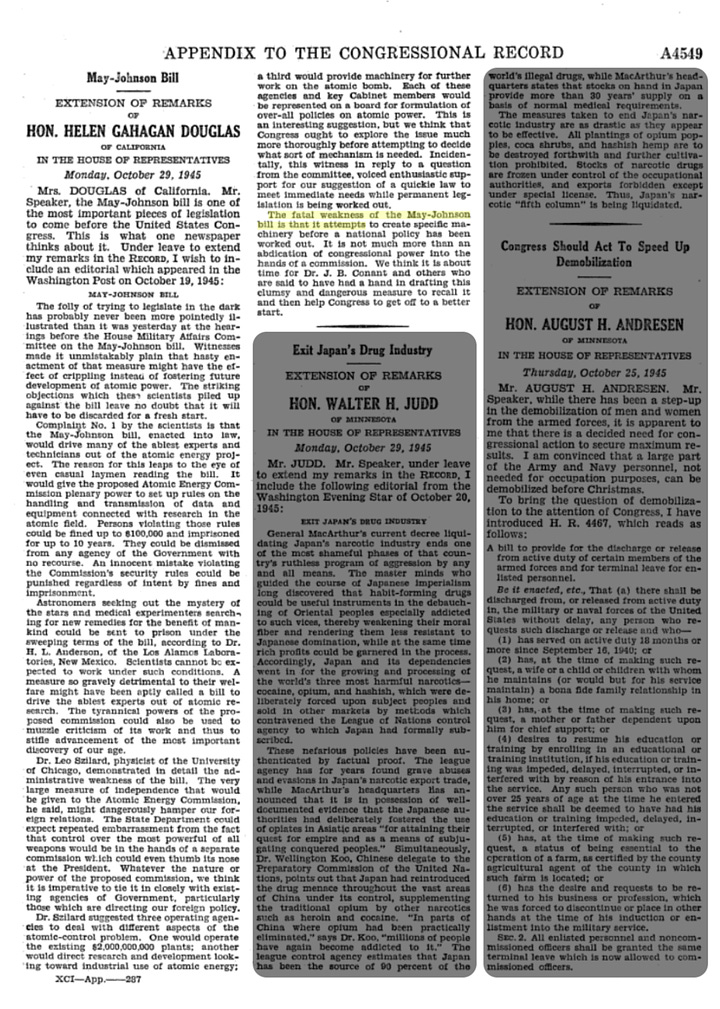

The fatal weakness of the May-Johnson bill is that it attempts to create specific machinery before a national policy has been worked out. It is not much more than an abdication of congressional power into the hands of a commission. We think it is about time for Dr. J.B. Conant and others who are said to have had a hand in drafting this clumsy and dangerous measure to recall it and then help Congress to get off to a better start.
-Washington Post, 1945
Cincinnati Times-Star editorial
For our next news article from the congressional record, (Seaver 1967) introduces most effectively:
“The press also took the liberty of chastising the War Department bill with respect to commission powers. The Cincinnati Times-Star of October 25, 1945, printed an editorial concerning the bill entitled “Dictatorship by Commission?”. Commission powers in this instance were described as creating the possibility that the commission might become more powerful than the government itself. In conclusion the editorial sounded an admonition that “…in our concern to restrain and harness the appalling force of atomic energy we must not invite the tragic consequence of a dictatorship by commission in the United States.”
-(Seaver 1967)
Here it is as entered into the record by Rep. Elston (R-OH)…
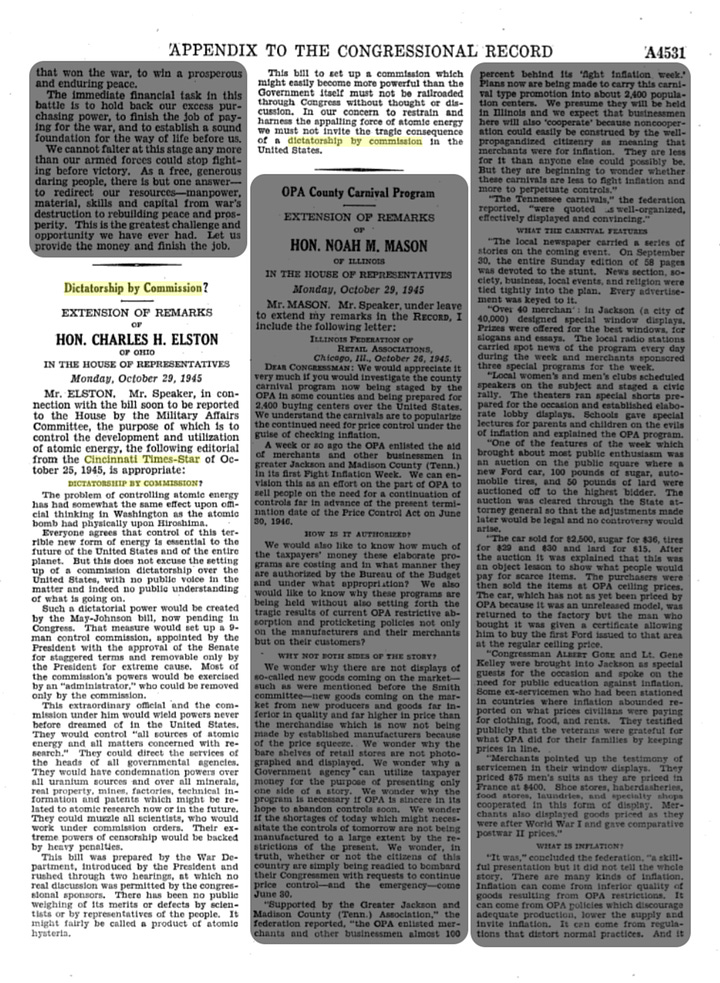
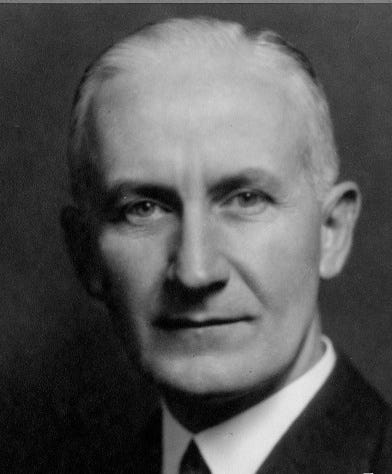
…and which is just an absolute treasure trove of descriptive quotes:
"But this [terrible new form of energy] does not excuse the setting up of a commission dictatorship over the United States, with no public voice in the matter and indeed no public understanding of what is going on."
"Such a dictatorial power would be created by the May-Johnson bill, now pending in Congress"
uh-huh…
"This extraordinary official and the commission under him would wield powers never before dreamed of in the United States."
"They could direct the services of the heads of all governmental agencies."
"They could muzzle all scientists, who would work under commission orders.” “Their extreme powers of censorship would be backed by heavy penalties."
you don’t say…
“This bill to set up a commission which might easily become more powerful than the Government itself must not be railroaded through Congress without thought or discussion.”
oh, yes…
“In our concern to restrain and harness the appalling force of atomic energy we must not invite the tragic consequence of a dictatorship by commission in the United States"“
…time for a cigarette.
Finally, we have Fielding Eliot from the New York Herald Tribune. He wrote, addressing himself to Gen. Leslie Groves, well-known as an outspoken proponent of the May-Johnson bill:
It is our lives you are playing wtih, General. It is our country's future. And we'd like, if you have no objection, to contineu to have these affairs of ours controleld under the arrangemnts we hjave found satsifactory for the last century in the Constitution of the Unitied States.
-Field Elliot, NY Herald Tribune (Seaver 1967)
(Emphasis mine). General Groves, of course, was the topmost boss of the bill’s lead drafter, Royall, while he was drafting it for the Manhattan Project’s Interim Committee. Given both the MP’s top-down structure and Groves’ observer status facing the Interim Committee, Royall was certainly drafting with Groves’ say-so.
The scientists speak
“Oh,” I hear you, likely-as-not-a-scientist, say, “why should I listen to what some politicians & journalists have to say - these are not my peers “.
Very well.
National Academy of Sciences
and let’s not forget Jewett’s quote from the previous article:
If this is what the past four years [WWII] has brought us to, then I wonder why we haev been so hot and bothered about Fascism, Nazism, and the Japanese [imperial militarism]."
- Frank Jewett, National Academy of Sciences president, 1945 (Zachary 1997)
Harold Urey
Speaking of his fellow practicing scientists who were forming up line-abreast against their administrative-scientist War Department bosses (and so swelling the ranks of the quickly-materializing Federation of American Scientists), this is Harold Urey. He led development of the gaseous diffusion process for refining uranium-235 from raw uranium feedstock for the Manhattan Project:
Urey’s experience with sprawling weapons development bureaucracies headed by a strongman can be summed up by the fact that his index entry in Norris’ Racing for the Bomb has subheading ‘LRG’s [Gen. Groves] dislike of’, followed by six unique page-indices. It’s no surprise then that Urey is reflexively concerned about how far the top job’s scope will creep in the bureaucracy-to-be.
“Because of the complexities of the problems of atomic energy, I believe the part-time Commission will have little knowledge of the whole field and the Administrator and Deputy Administrator will become, by various means, but largely because of their superior knowledge, the directors of the Commission rather than the reverse.”
-Dr Harold Urey (Seaver 1967)
(In an apparent attempt at producing one of history’s earliest Godwin’s) Urey said the May-Johnson bill was the
“. . . first totalitarian bill ever written by Congress. . . . You can call it either a Communist bill or a Nazi bill, whichever you think is the worse.”
-Dr Harold Urey (Hewlett & Anderson 1962)
Unfortunately, in his passion, Dr. Urey errs - - this bill was not written by Congress.
Drs. Jewett & Urey were far from alone among scientists. Recall that the Federation of American Scientists was birthed into existence precisely by its scientist constituents’ opposition to May-Johnson. Urey was a FAS founding member.
Recap
My long-form post of June 2024 made the case that May-Johnson served as prototype for The Legacy Program's modus operandi. We now see that politicians, journalists, and scientists all expressed concern & fear that a Commission & Administrator installed by May-Johnson would become a metastasizing power-grab rivaling —and perhaps even de-facto overpowering— the authority of both the Legislative & Executive branches of the US Government. In quotes from each of these constituencies of society, you can also find their expression —either explicitly or de-facto— that May-Johnson, if it ever passed, would be found unconstitutional.
In Closing…
If you are in The Legacy Program, you now have as clear a signal that anyone working for a compartmentaliᶻed clandestine enterprise possibly could that The Legacy Program you work for began, and almost certainly remains to this day (thanks to the impossibility of transparent oversight amid overwhelming secrecy), an extra-constitutional multi-decade power-grab.
Take a scroll-back through all the headshots of representatives in the last few sections. These were the contemporaries of your superiors’ grand-parents, and of your great-grandparents. You can see by their own words how strenuously they were striving to avert the creation of an unconstitutional leviathan.
For as long as you’re not actively working to dismantle the edifice, you should feel horrified and ashamed for participating in something that is so antidemocratic - so antithetical to the values that your managers tell you that you are fighting for. They are lying to themselves and they are lying to you. I don’t know how to make it more clear than that.
You should be looking in the mirror and asking “Why am I enabling building an enterprise that is…
• …hurtful to equity?”
• …hurtful to speech?”
• …hurtful to peoples’ rights?”
• …hurtful to peoples’ dignity?”
• …hurtful to scientific advancement?”
• …hurtful to values of transparency & accountability?”
We all wish to hear your answer to these questions.
Yours truly,
Blocked Epistemology
PS (For those who by contrast are actively working toward transparency, however you go about it, you are national and supranational heroes).
Acknowledgements
Would like to thank Rich Geldreich for finding and providing the link to the Seaver TTU thesis (which in turn provided the reference to the contemporary WaPo and Cincinnati Times-Star articles). And thanks to David Seaver for great policy analysis over a half-century ago. Moral support received from members of the UAP transparency community at large remains ever-appreciated.
Bibliography
Burns, TL; The Origins of the National Security Agency 1940-1952; United States Cryptologic History Series V, Vol 1; Center for Cryptologic History, NSA, 1990
accessible at: https://archive.org/details/Origins-NSA-Declassified2004/mode/2up
Goitein, E; “The New Era of Secret Law”; “Brennan Center for Justice at New York University School of Law”, 2016
accessible at: https://www.brennancenter.org/sites/default/files/publications/The_New_Era_of_Secret_Law.pdf
Goldberg S.; “Inventing a Climate of Opinion: Vannevar Bush and the Decision to Built the Bomb”; Isis, vol. 83, 1992
accessible at: https://www.jstor.org/stable/233904
Hewlett R., Anderson O.; “The New World, 1939/1946”. University Park: Pennsylvania State Univ. Press. 1962
accessible text: https://www.energy.gov/management/articles/hewlett-and-anderson-new-world
Holifield, C. and Price, M; "Dissenting Views of Members of the Military Affairs Committee on H.R. 4566"; H. Rept. 79th Congress, 1945
Accessible at: https://www.nrc.gov/docs/ML1810/ML18102A021.pdf (large file) , pdf-page 1,051, printed-page 1048
Rudesill, D; “Coming to Terms with Secret Law”, Harvard National Security Journal, Vol. 7, 2015
accessible at: https://harvardnsj.org/wp-content/uploads/2016/05/Rudesill-Secret-Law.pdf
Seaver, D; “Origin and Significance of the Atomic Energy Act of 1946”; Master’s Thesis, Texas Technical University, 1967
accessible at: https://ttu-ir.tdl.org/server/api/core/bitstreams/e281cb19-a846-4e1a-88fa-b2ff7da0c587/content
Shafer et al.;"Additional Minority Reviews to Accompany HR 4566”, H Rept. 1186, 79th Cong, 1st Sess. 1945
Accessible at: https://www.nrc.gov/docs/ML1810/ML18102A021.pdf (large file) , pdf-page 1,054, printed-page 1051
The Editorial Board. "Dictatorship by Commission" [Editorial]. Cincinnati Times-Star, October 25th, 1945
Accessible at: https://www.google.com/search?tbm=bks&q=pUs5RIUaLBIC p.A-4531
The Editorial Board. "May-Johnson Bill" [Editorial]. Washington Post, October 19th, 1945
Accessible at: https://www.google.com/search?tbm=bks&q=pUs5RIUaLBIC p.A-4549
Truman, H. “Memorandum for: The Secretary of State, The Secretary of Defense” NSA (), The White House, 1952
accessible at: https://nsarchive2.gwu.edu/NSAEBB/NSAEBB278/02.PDF
Zachary G. “Endless Frontier: Vannevar Bush, Engineer of the American Century”. New York: The Free Press; 1997
Amazon: https://www.amazon.com/Endless-Frontier-Vannevar-Engineer-American/dp/1501196456
Unlock further investigation & analysis
I hope the reader will not be surprised to learn that multi-decade clandestine UAP crash-retrieval & reverse-engineering programs operating extra-constitutionally probably don’t extinguish themselves. It takes lots of research effort on the part of many building on each other. If you want to see The Legacy Program brought back under oversight, support this research - its past accomplishments, its awareness building, and growth of its upcoming scope. Together we can bring transparency to an activity of monumental global importance that would rather gaslight us as to its very existence than operate under rule of law.
Blocked Epistemology’s ETH wallet public key:
0x5FF4Ba5Ab5D0F157165b9c79B6A088A1D3B0d799Or if you prefer, consider contributing ResearchCoin $RSC to the ResearchHub post mentioned earlier instead to attract reviewers.
License
“The Bill is of Doubtful Constitutionality”© 2024 by Blocked Epistemology is licensed under CC BY-ND 4.0
Beyond implicit fair-use provisions, this license allows for commercial redistribution of the unedited work (the ND restriction still allows for format changes). As ND restricts translations, if you wish to distribute an accurate translation just message in the comments so I can respond, review & provide permission.
Appendix
Appendix-A: Additional illustrations





